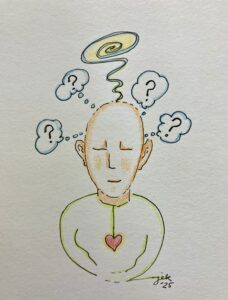
-Artwork © 2025 Jan Ketchel
When humanity acquired consciousness it gained the divine prerogative to tell the subconscious mind what to do. The subconscious mind has the divine capacity to create whatever is suggested to it. Both the conscious and subconscious minds have divine attributes. Words, in the form of suggestions from the conscious mind, become flesh, as they are outwardly manifested by the divine power of the subconscious mind.
Back in the days before Prometheus stole the fire of consciousness from the gods, and Adam and Eve from the Tree of Knowledge, human beings had no choices; they religiously obeyed the divine laws of instinct. Instinct is housed in the subconscious mind, which essentially ruled human life in a consistent way until the birth of human consciousness.
With consciousness as the new absolute ruler, suggestions are able to be delivered that can override instinctive programs with new programs that create and destroy with abandon.
There are a couple of checks to this absolute power. Most powerful has been the rational mind, which dismisses divine power outright. With its material bias, it limits people’s belief in their latent divine powers. If you don’t believe you have an ability you won’t exercise it.
Furthermore, you won’t arouse the emotional enthusiasm needed to attract the subconscious mind’s attention to a new suggestion. In this scenario the subconscious will nonetheless continue to exercise its divine power by manifesting life scenarios that fulfill the conscious mind’s limited views of itself.
The other major check on these divine powers is the nearly absolute power of socialization, saturated with limiting negative thoughts, which becomes internalized as an incessant internal dialogue, that then creates the shadowy reality envisaged by such suggestions. Such is the great mirror of this time on the world stage.
Suggestions are everywhere. Besides the billions spent to influence people’s minds at every turn are the thoughts of humanity, and dimensions beyond, that telepathically impinge upon the subconscious mind. The seduction of social media opens the floodgates to intense emotion and powerful suggestions.
Some form of meditation practice, as well as a strong suggestion to the subconscious to block the messaging of outside influences, can greatly protect one’s mind space and the ability to think and feel for oneself.
Consciousness itself must also assume responsibility for the suggestions it chooses to expose itself to. The suggestions we impress upon the subconscious are expressed in our physical reality. Suggestion is destiny. We become what we feel and believe to be true.
Our ego consciousness is largely centered in three-dimensional reality, hence it tends to be more narcissistically concerned about its own survival. This isn’t a judgement, it’s a fact. However, ego has the capacity to turn to its High Self, at the meeting place of the heart center, and ask for guidance.
The High Self lives in the subtle plane of fourth-dimensional reality. From its perspective of refined love and infinity it will tell the ego the truth, what is truly right. Of course, it remains for the ego to acquiesce or continue to operate in feigned ignorance as it struggles to evolve. The High Self never insists; it knows the ego must mature into adulthood and truly assume responsibility in its current plane of existence.
Nonetheless, the High Self feels nothing but unconditional love for the ego self. Actually, the ego, in its three-dimensional life, is the dream of the High Self. Nothing but love and truth is felt and offered to this child of the dream.
When the ego approaches the subconscious mind, with its divine capacity to create, it’s critical to be sure of the greater rightness of that which it asks for. The subconscious will not challenge or question a suggestion—that is rightly the job of consciousness.
If the intent and emotion is strong enough the subconscious will manifest the suggestion into reality. It is equally capable of manifesting good or evil. The ego is responsible for assuring the greater good of all with its suggestions. The divine in the subconscious mind allows the ego total freedom of choice. The ego will ultimately grow by experiencing the full effect of its manifested suggestions. These are divine lessons.
When requesting healing from the subconscious mind it is wise to consult with the High Self as to the true etiology of one’s symptoms. In general, all physical manifestations, including illness, issue first from the subtle mental plane, as suggestions that then physically manifest.
These are the kinds of questions to ask the High Self, with true receptivity to exploring the answers one receives:
“What is the cause of the symptom I bear?”
“From whence and where has this suggestion originated?”
“Am I being shown the negative effects of a suggestion I insisted upon manifesting?”
“Is the cause of my symptoms a reflection of error in my intentions?”
Of course, we must address issues of our physical reality with physical interventions, but getting to the true subtle mental root of an issue can mitigate a recurrence of that physical issue. Relief of symptoms is welcome, but no guarantee of cure.
Sometimes merely aligning one’s resolve with one’s deepest truth provides instant cure. Oftentimes, however, a greater process of discovery and transformation will unfold.
The key to the responsible use of the divine power of the human mind is to obtain the truth and guidance from the High Self. We are clearly in the early adolescence of our divine power maturation.
Be humble, be honest with self. Assume responsibility. Be in awe, be in love.
The divine is always helping us,
Chuck




